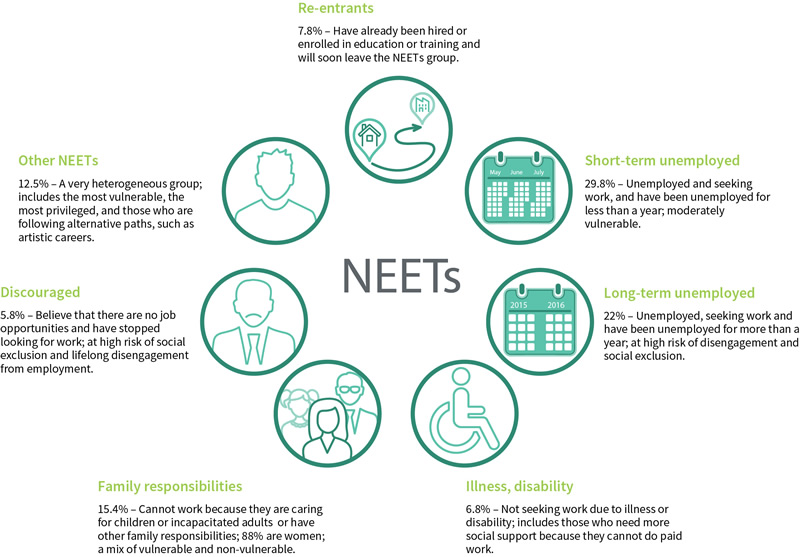EU context
Táto koncepcia sa v bohatej miere využíva ako indikátor na formovanie politík orientovaných na mladých ľudí v oblasti zamestnateľnosti, vzdelávania, odbornej prípravy, ako aj sociálnej inklúzie v 28 členských štátoch EÚ už od roku 2010.
O NEET sa po prvý krát konkrétne hovorilo počas diskusií k európskej politike v rámci hlavnej iniciatívy stratégie Európa 2020 s názvom Mládež v pohybe. Vekovú kategóriu spadajúcu pod tento termín tvorili mladí ľudia vo veku 15 – 24 rokov a neskôr sa rozšírila na 15 – 29 rokov. Táto koncepcia je v súčasnosti centrálnou súčasťou dialógu o politike na úrovni EÚ. Momentálne medzi NEET patrí 14,2 % populácie vo veku 15 – 29 rokov.
V apríli 2013 bol prijatý návrh Európskej komisie Rade Európskej únie týkajúci sa vykonávania záruky pre mladých ľudí vo všetkých členských štátoch. Jasným cieľom politiky záruky pre mladých ľudí je znížiť počet NEET. Cieľom tejto iniciatívy je zabezpečiť, aby všetci mladí ľudia vo veku 15 – 24 rokov dostali kvalitnú ponuku zamestnania, ďalšieho vzdelávania, učňovskej prípravy alebo stáže do štyroch mesiacov po strate zamestnania alebo ukončení formálneho vzdelania. Zavedenie záruky pre mladých ľudí v členských štátoch prostredníctvom iniciatívy na podporu zamestnanosti mladých ľudí prispelo k zlepšeniu situácie v tejto oblasti a zníženiu počtu NEET.
Len nedávno, 7. decembra 2016, Európska komisia zaviedla iniciatívu Investícia do európskej mládeže, ktorá je obnovením úsilia o podporu mladých ľudí. Keďže dôsledky záruky pre mladých ľudí možno do dnešného dňa považovať za pozitívne, Komisia plánuje podporiť a rozšíriť dostupné financie pre iniciatívu na podporu zamestnanosti mladých ľudí do roku 2020, aby napomohla zefektívniť aktívnu pomoc mladým ľuďom.
Práca nadácie Eurofound
Realizáciou záruky pre mladých ľudí počet NEET vo veku 15 – 29 rokov mierne poklesol z približne 14 miliónov v čase vyvrcholenia krízy na 12,5 milióna v roku 2016 (14,2 %). Na základe prieskumu nadácie Eurofound sa však aj naďalej odhaduje, že strata pre európske ekonomiky siaha až do výšky približne 142 miliárd EUR ročne (2015) – v podobe dávok a straty príjmov a daní. To má významný vplyv na hospodársky a spoločenský vývoj EÚ.
Hlavné príspevky
Do dnešného dňa nadácia Eurofound ako vôbec prvá začala rozsiahly výskum NEET (pozri publikácie uvedené nižšie) a podarilo sa jej:
- vykonať prvú komparatívnu analýzu NEET v EÚ,
- objasniť, kto patrí k NEET,
- odhadnúť hospodárske náklady na NEET,
- preskúmať sociálne dôsledky pre ľudí v kategórii NEET,
- odhadnúť rizikové faktory zaradenia sa do kategórie NEET,
- preskúmať účinnosť politik na reintegráciu NEET,
- monitorovať vykonávanie záruky pre mladých ľudí.
Rozmanitosť NEET
V rámci tohto výskumu sa nadácia Eurofound usilovala aj o objasnenie rôznorodosti populácie NEET. Najnovšia štúdia o rozmanitosti NEET prináša nové rozdelenie na sedem podskupín s cieľom sprehľadniť zloženie tejto skupiny mladých ľudí. Ide o to, aby tvorcovia politík mohli lepšie pochopiť, kto do kategórie NEET patrí, a aby sa dali ľahšie navrhnúť primerané podporné opatrenia na pokrytie veľkého množstva potrieb. Každú z týchto skupín tvorí kombinácia zraniteľných aj nezraniteľných mladých ľudí, ktorí dobrovoľne alebo nedobrovoľne neakumulujú ľudský kapitál prostredníctvom formálnych kanálov.
Iné témy výskumu
Okrem uvedenej štúdie nadácia Eurofound skúmala v posledných rokoch aj tieto oblasti (pozri publikácie uvedené nižšie):
- charakteristika a hodnoty podnikania mládeže,
- ako zapojiť tzv. vynechaný stred – mladých ľudí so stredoškolským vzdelaním, ktorí nepokračujú v akademickej ceste za vysokoškolským vzdelaním,
- sociálna inklúzia mladých ľudí,
- prechody mládeže na pracovnom trhu,
- nárast dočasného zamestnávania medzi mladými ľuďmi a prístup k sociálnej ochrane,
- pracovné podmienky mladých ľudí, ktorí vstupujú na pracovný trh,
- vývoj najnovších politík týkajúcich sa NEET.
Pozrite si zoznam publikácií nižšie.
Súvisiace: Skúmanie rozmanitosti NEET
4. júla 2016 – Po správe nadácie Eurofound NEET – Mladí ľudia bez práce z roku 2012 sa v tejto správa skúma rozmanitosť NEET prostredníctvom siedmich navrhovaných podskupín, do ktorých sa populácia NEET dá rozdeliť, pričom sa využívajú údaje získané z výberového zisťovania pracovných síl EÚ z roku 2013. Tieto podskupiny umožňujú lepšiu analýzu toho, ako politiky, spoločenské prostredie a postupné pomalé zlepšovanie trhu práce ovplyvnili populáciu NEET EÚ28. Pomáhajú zistiť, ako sa dajú vyriešiť problémy v prípadoch, kde, napríklad, z dlhodobo nezamestnaných tvoria 22 % NEET vo veku 15 – 24 rokov. K dispozícii sú aj profily 28 krajín zamerané na rozmanitosť NEET, v ktorých sa zachytáva obraz situácie NEET na úrovni členských štátov. Skúmané sú trendy v zamestnanosti mladých ľudí a počte NEET, zloženie skupiny NEET a nakoľko im hrozí sociálna exklúzia.
Skúmanie rozmanitosti NEET
Informačná grafika na tému NEET













